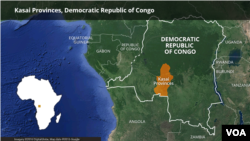Thousands of people forced from their homes by violence in the Democratic Republic of Congo have returned to their villages after months in hiding to find houses burned, health centers looted and nothing to eat, aid workers said on Wednesday.
Fighting between government forces and local militia has recently subsided in Congo's central Kasai region although violence rages on in other parts of the vast Central African country.
About half of the 1.5 million people displaced in Kasai since last year have returned home, the United Nations said last week, with 3.9 million people still displaced throughout the country.
Many of the returnees had fled armed attacks with nothing but the clothes they were wearing and were forced to hide in the forest for months, aid workers said.
Although the immediate danger has waned, the risks of starvation, disease and homelessness remain rife.
"Some women had to give birth in the bush, with no access to healthcare," said Red Cross spokeswoman Aurelie Lachant after a visit to Kasai.
"When they came back, many people said their houses had been burned," she told the Thomson Reuters Foundation.
Malnutrition rates are soaring because people in hiding had to scavenge and go without food, said Gabriel Sanchez, operational manager for medical charity Medecins Sans Frontieres (MSF).
They also missed the harvest season and lost most of their farming tools, he said. While some have left to seek work in cities, others are staying behind to rebuild.
"All the normal sources of revenue have been completely upended," Sanchez said, adding that half of the health centers in the area have been looted or wrecked.
"A good number of villages were almost totally destroyed," he told the Thomson Reuters Foundation Up to 250,000 children are at risk of starving in Kasai in the next few months unless they receive urgent aid, the U.N. World Food Program said this week.
The United Nations has declared Congo a level three humanitarian emergency — the highest possible classification and on par with Iraq, Syria and Yemen.
Worsening violence this year has been fuelled in part by President Joseph Kabila's refusal to step down at the end of his second elected term in December last year.
Reporting By Nellie Peyton, Editing by Belinda Goldsmith.





